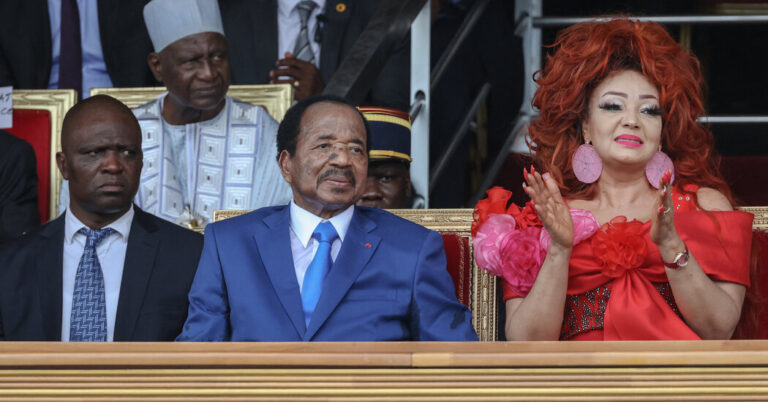When President Biden abandoned his re-election campaign this month, citing the need to “pass the torch to a new generation,” some of the most envious accolades he received came from 6,000 miles away.
In central Africa, in coastal Cameroon, many are longing for their president, Paul Biya — at 91 the world’s oldest leader — to take a leaf out of President Biden’s book. But most think he never will.
“He’ll do everything to remain in power,” said Lukong Usheno Kiven, a human rights advocate based in Yaoundé, the capital of Cameroon, where Mr. Biya has been in power for 42 years.
Mr. Biya is just one of dozens of notably aged leaders who are also far older than the populations they serve.
Presidents Xi Jinping of China and Vladimir V. Putin of Russia are both 71. India’s prime minister, Narendra Modi, is 73. Israel’s leader, Benjamin Netanyahu, is 74, while Mahmoud Abbas, the president of the Palestinian Authority, is 88.
But it is in Africa — the world’s youngest continent — where the gerontocracies are most stark. Eleven of the world’s 20 oldest leaders are African, according to research done by the Pew Research Center.
The presidents of Ivory Coast and Equatorial Guinea, Alassane Ouattara and Teodoro Obiang Nguema Mbasogo, are both 82. Namibia’s 82-year-old interim president, Nangolo Mbumba, took office in February after the sitting president who was also age 82, died. Zimbabwe’s president, Emmerson Mnangagwa, is 81.
None of those countries has a median age higher than 22.
And many of those young people want their leaders to follow President Biden’s lead and head toward the exit.
Mr. Biden displayed “principled political leadership,” by stepping out of the race, said Rashweat Mukundu, a Zimbabwe-based adviser for International Media Support, which supports the rights of journalists.
“We don’t see that level of political maturity in Africa,” he added.
Countries that are less free tend to have older leaders, the Pew research showed. President Biden is the world’s 10th oldest leader. Of the other nine, only one leads a country classified as “free” by the think tank Freedom House. That is Mr. Mbumba, the Namibian president.
Some Namibians have long been pushing for younger leaders, said Rakkel Andreas, a political analyst in Windhoek, the southern African country’s capital — and Mr. Biden’s withdrawal has intensified chatter about aging leaders. Opponents of Vice President Netumbo Nandi-Ndaitwah, who is now the front-runner in Namibia’s election in November, have honed in on her 71 years.
But many Namibians have felt reassured about their own nation after seeing Mr. Biden’s age-related struggles, Ms. Andreas said.
“For the longest time, African leaders have been dubbed as these old people, not competent,” she said. “The whole world is seeing how the leader of the most powerful nation is clearly needing to retire.”
Presidents have handled the effects of their advancing years in different ways. When Zimbabwe’s late president Robert Mugabe appeared to be taking naps during meetings, aides claimed the nonagenarian was merely “resting his eyes.” Nigeria’s former president Muhammadu Buhari, who left office last year at age 80, disappeared for long stretches of his presidency to receive medical treatment abroad, and once complained that working for six hours per day was “no joke.”
By contrast, Yoweri Museveni, Uganda’s 79-year-old president, made headlines when he shared his indoor workout routine during the pandemic.
“I’m going to start by warming up,” he said, before jogging barefoot laps of his red-carpeted office and doing push-ups as cameras flashed.
One commenter wrote, “Let’s see Biden do 3! My president is still solid as a rock.”
Some Africans justify the advanced age of their leaders. There is a “high reverence for elders as patriarchs,” said Elvis Ngolle Ngolle, a senior member of Mr. Biya’s political party, in Cameroon.
“Political cultures are different,” he said.
Africa has lately acquired a handful of much younger presidents. But most of them have taken power by force: like the 41-year-old leader of Mali, the 44-year-old leader of Guinea, or Burkina Faso’s Ibrahim Traoré, who is, at 36, the world’s youngest president. In Chad, the 40-year-old president, Mahamat Déby, who is the son of its longtime leader who died on the battlefield, won a disputed election in May.
Senegal’s Bassirou Diomaye Faye, age 44, is different. He won an election in the West African country, going from a prison cell to the presidency. His victory was hailed across the continent by youth yearning for a new generation of leaders.
President Biden’s withdrawal gave African youth more hope — though hope for change is thin on the ground in Cameroon, where Mr. Biya’s government brooks no dissent, and frequently cracks down on any opposition, according to rights groups. President Biya spends long stretches abroad, including in a luxury hotel in Geneva — but few expect anyone but him to win next year’s election.
“Despite Biden’s Withdrawal … Cameroon is Cameroon,” read one recent newspaper headline in the central African country.
Elian Peltier contributed reporting from Dakar, Senegal; John Eligon from Johannesburg, South Africa; Abdi Latif Dahir from Nairobi, Kenya; Ndi Eugene Ndi from Yaoundé, Cameroon; and Jeffrey Moyo from Harare, Zimbabwe. Jack Begg contributed research.



